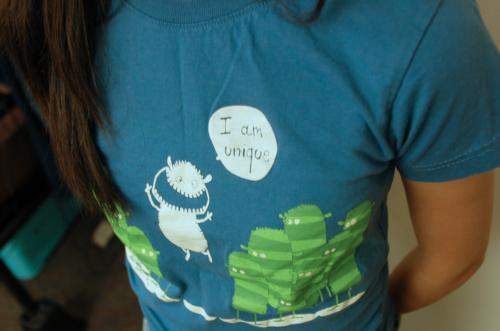
Heart on Your Breasts
This fall, your torso is the new Facebook. With the growing popularity of message T-shirts, clothing has become prime real estate for self-expression.
Harvard students gathered last Friday in Adams Art Space for a T-shirt decorating get-together, where students wrote messages on various items of clothing using markers and fabric paint. Clement D. Wright ’09, an organizer of the event, discussed the cult of the identi-tee. “Its fun to grab a T-shirt out of your drawer and say, ‘This talks about who I am and what I’m into,’” he says. Wright himself scrawled lines of poetry on his white T-shirt.
Popular T-shirt messages can range from the poetic to the political. These days, students can pick up a cause like they pick up laundry, with T-shirts meant to support Darfur (“Save Darfur”), Obama (“BaRock My World”), and awareness about AIDS (the newly-popular “HIV-Positive” tees).
But sometimes, casual campaigning can underplay the seriousness of an issue. “I get mad when I see people wearing shirts of Mao Zedong,” says Justine S. Chow ’10, another student who attended the T-shirt making event. “They don’t know what he did. He tore my family apart.”
Nonetheless, some students feel that the message tee is a convenient forum. “I don’t think it cheapens the message,” Wright says. “It’s a cool way to show your beliefs. It makes people think.”
While the effects of certain messages are ambiguous, some are crystal clear: think twice before you go the “I facebooked your Mom” route.


